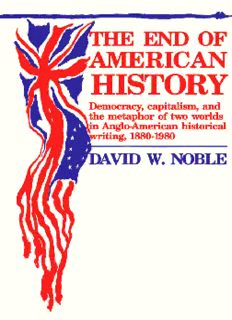
The End of American History: Democracy, Capitalism, and the Metaphor of Two Worlds in Anglo-American Historical Writing, 1880-1980 PDF
Preview The End of American History: Democracy, Capitalism, and the Metaphor of Two Worlds in Anglo-American Historical Writing, 1880-1980
THE END OF AMERICAN HISTORY The publication of this book was assisted by a bequest from Josiah H. Chase to honor his parents, Ellen Rankin Chase and Josiah Hook Chase, Minnesota territorial pioneers. THE END OF AMERICAN HISTORY Democracy, capitalism, and the metaphor of two worlds in Anglo-American historical writing, 1880-1980 DAVID W. NOBLE University of Minnesota Press • Minneapolis Copyright ® 1985 by the University of Minnesota All rights reserved. No part of this publication may be reproduced, stored in a retrieval system, or transmitted, in any form or by any means, electronic, mechanical, photo- copying, recording, or otherwise, without the prior written permission of the publisher. Published by the University of Minnesota Press, 2037 University Avenue Southeast, Minneapolis MN 55414 Printed in the United States of America Second printing, 1989 Library of Congress Cataloging in Publication Data Noble, David W. The End of American History. Includes index. 1. United States-Historiography. I. Title. E175.N63 1986 973'.072 85-1077 ISBN 0-8166-1415-6 ISBN 0-8166-1416-4 (pbk.) The University of Minnesota is an equal-opportunity educator and employer. For Martha, Tasslyn, Alice, Andrew, Matthew, Joshua, and Jonathan Our grandchildren TThhiiss ppaaggee iinntteennttiioonnaallllyy lleefftt bbllaannkk This page intentionally left blank Contents Acknowledgments ix Chapter 1. Reformation and Renaissance: Republican Virtue and the American Promised Land 3 Chapter 2. Frederick Jackson Turner and Charles Beard: International Capitalism or International Democracy, 1880-1920 16 Chapter 3. Charles Beard: American Democracy or International Capitalism, 1920-48 41 Chapter 4. Reinhold Niebuhr: International Marxist Democracy or American Capitalist Democracy, 1915-55 65 Chapter 5. Richard Hofstadter: American Democracy or American Capitalism, 1940-70 90 Chapter 6. William Appleman Williams: Universal Capitalism, Universal Marxism, or American Democracies, 1955-80 115 Chapter 7. The 1980s and the Irony of Progress: Limits on the Development of Democracy, but No Limits on Economic Development 141 Notes 149 Index 163 TThhiiss ppaaggee iinntteennttiioonnaallllyy lleefftt bbllaannkk This page intentionally left blank Acknowledgments The greatest influence on my approach to the history of ideas came from Carl Becker's The Heavenly City of the Eighteenth-Century Philosophers, which I read as an undergraduate in 1947. Undergraduate courses from Eric Goldman and Stow Persons also were crucial in giving me a perspective on the years between 1890 and 1940 and the place of that period within the larger context of the his- tory of ideas in America. Both taught me to think about the 1890s and 1940s as watershed decades. In graduate school, Merle Curti shared his sense of the crisis of Progressive historiography in the 1940s and encouraged my study of the assumptions that underlay the Progressive outlook. Henry Nash Smith's Virgin Land added a significant dimension to the concept of crises in particular climates of opinion which I had learned from Becker and Persons. Then Thomas Kuhn's The Structure of Scientific Revolutions provided another lan- guage for discerning such crises. Correspondence with Gene Wise, as well as his book, American Historical Explanations, encouraged me to apply Kuhn's lan- guage to the work I had already done for my 1965 book, Historians against His- tory, and to reconsider the importance of the 1940s as a decade of dramatic change. Friends, colleagues, and students who have been particularly helpful in sharpening my ideas on the crises of the 1890s and 1940s, and on the issue of paradigmatic change, are Robert Schneider, Gayle Graham Yates, Harry Boyte, Joseph Amato, Peter Carroll, Bruce Stuart, Richard Chase, James Youngdale, Earl Shaw, Lary May, Susan Beck, John Plomondon, Darryl Hattenhauer, Garvin Davenport, Michael Passi, Ralph Brauer, Richard Nigro, David Howard-Pitney, Colette Wanless, David Fields, Deanne Lundell, Heather Huyck, Richard Nelson, Robert Lerfald, Ruth Townsend, Thomas Woods, David Horowitz, Terrence Ball, Steven Trauman, Sue Beckam, and Karin McGinnis. Marlene Tungseth of the University of Minnesota Press has greatly improved the style of the book. The help of my wife, Lois K. Noble, has been, as always, invaluable in editing and preparing the manuscript for publication. ix
